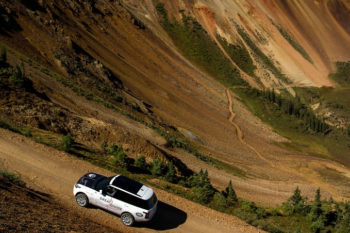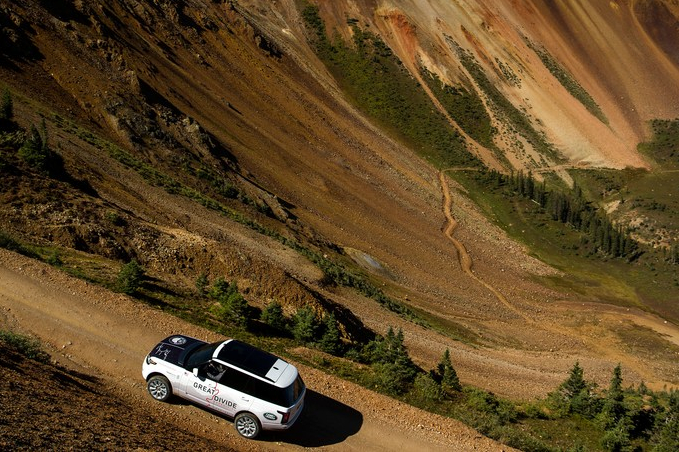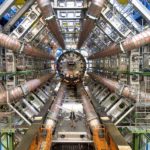The Car-Universe Without A Motor, part 3: The Post-Big Bang Entropy Mountain
The concept of the Big Bang starts with the universe existing as a singularity in the distant past (before 13.8 billion years ago or so), which for some reason explodes and expands to form the universe as we know it. As for what a singularity is, if we imagine all the matter in the universe being in one place at one time, essentially a single dot in space with practically infinite gravity, it would then be a singularity–a term which also defines “black holes” (the more technical term is gravitational singularity or spacetime singularity). The post-Big Bang expansion, which created a very low entropy state, is the subject of this post. And since that low-entropy initial expansion did not have to happen the way it did–what is supposed to have happened is extremely highly improbable–it constitutes a mountain in the metaphor this series is using (of a car going either naturally downhill versus needing a motor to go uphill).
By the way, to briefly give an introduction to entropy (and link a longer introduction), entropy is the property of the universe (as referred to in the Second Law of Thermodynamics) that refers to a very disordered, randomized state in which all parts will be the same as each other. Like my bedroom–instead of having books in one place and clothes in another when it is well-ordered, it eventually gets to the point where both the books and clothes are spread equally all over the place, maximum bedroom entropy. 🙂 Over time, the universe as a whole heads towards maximum entropy–and started with very low entropy.
To make the significance of this topic clearer, let’s talk about how evolution as a whole is often presented. In the version of evolution I’ve heard Richard Dawkins defend in a debate, the universe is supposed to have started out simple. Yes, where the matter of the universe comes from in the first place may be somewhat mysterious in the view of someone like Dawkins as are the origins of the laws of nature that guide the formation of the universe, but he speaks as if these are minor details. The very beginning of time should be considered an exception to the ordinary ideas about cause and effect, Dawkins and others in effect say. But once you grant the original origin of matter/energy and the laws of physics that guide their development, everything else just “rolls downhill” (my term) from there: The simple universe of expanding gas collapses into stars that form galaxies, the stars first create the chemical elements that build planets and everything else, then planetary systems form. The planets gather up chemicals that spontaneously produce life and that life gets more and more complex over time via Natural Selection.
There are numerous problems with this concept that Dawkins and others have defended, the first of which is the universe did not start simple. From any point of view, asking where the matter in the original singularity came from is a legitimate question, as is asking how that initial singularity broke apart in the first place (what could be so powerful to “explode” the biggest black hole you could imagine?). But I’m choosing not to ask those questions in this series.
I’m granting for the sake of argument (not because I believe it) that the matter/energy at the beginning of time (as modern science sees it) could just spawn itself out of nothing. Let’s also grant that initial matter could “explode” for inexplicable reasons and the laws of nature we know just popped up without explanation. Even so, even granting those concessions, the universe still would not spontaneously generate itself as we know it. Not from things just operating as they normally do. There are too many obstacles (too many steep uphill slopes) between the imagined beginning and now–though in fact just one “hill” is all that it takes to ruin a strictly naturalistic view of the universe.
Just one major hill climb from a base of zero in the past history of our metaphorical car and a reasonable person would conclude that the car did not just naturally come to where it is now on its own. It makes more sense to presume it had a motor, even if we can’t see the motor–that something, or someone, pushed the vehicle instead of it rolling on its own. Likewise, it only takes one major obstacle in the imagined history of the universe to call into question how its been imagined to evolve. But there are in fact four such obstacles I’m going to discuss and I will touch on a fifth.
The first of these obstacles has to do with the expansion of the universe right after the Big Bang, as mentioned above. The most common explanation of how this happened is called inflation, which essentially sees the universe as if every bit of matter repelled every other bit (whether this was caused by actual “anti-gravity” as Brian Greene mentioned in his 2005 book The Fabric of the Cosmos, or by other forces, is up for debate). Inflation is thought to have happened for far less than a billionth of a second (between 10-36 seconds and perhaps 10-32 seconds after the Big Bang was last a singularity). Why is that timing so precise?
It’s not just the timing that’s precise, it’s the forces that would be involved that would require a great deal of fine-tuning for the universe to turn out as it did. The fine-tuning aspect is explained in the Wikipedia article on inflation I referenced above, which details many objections to the inflation of the universe if you slog through the whole thing (well, I have to slog through and put out effort to understand the basic concepts involved. Some potential readers of this post may find the Wikipedia article easy to read and understand–and so should easily see my point). Note though that even though it’s fraught with problems, inflation remains the leading scientific view of how the universe expanded just after the beginning of the Big Bang.
Note that if the numbers for inflation aren’t balanced just right, the universe either is too dispersed to ever form stars and planets (and planetary inhabitants), or it winds of clustering up right away into a universe composed of black holes, as I will say more about it a bit.
Please also note that there are mathematicians and cosmologists who deny that inflation happened at all, which means the universe would have expanded without a period of frantically fast and ultimately inexplicable growth known as inflation. Roger Penrose in particular pointed out in his 2010 book, Cycles of Time that some of the problems of a very low entropy universe can be mathematically resolved by stating this universe is just the latest in a series of repeating universes, the end of the last one paving the way for the smooth and low-entropy expansion of this one.
I’m indebted to Penrose (who is an atheist) for imparting on me a full understanding of how unlikely the low-entropy expansion of the universe right after the Big Bang was and how much it did not flow from already-established laws of nature. Penrose made it plain that the most likely thing that would have happened in the early universe (even after granting the matter of the universe sprouting from nothing and the laws of physics inexplicably on hand to guide the process) was that the still very dense post-inflation universe would have formed clusters of other singularities, which would have made a universe without stars, planets, or life.
Yes, it’s possible all the matter particles in the universe aligned just right to create the low-entropy state of the universe–an expanding gas susceptible to creating stars. But it is so unlikely that Penrose estimated it would be more likely for the entire Solar System and all that is in it (including us) to spontaneously emerge via random quantum motion of particles than it would be for the whole universe to arrange itself from the beginning in such a low-entropy state.

Photo credit: automobilemagazine.com
It’s also possible, since quantum mechanics provides for random motion of particles, for all the molecules in a parked automobile to first jostle in one direction to disengage the brakes, then put the transmission in neutral, then by rotational alignment of a series of pushes in the wheels, cause the car for twenty minutes to roll up a mile-high mountain pass without any use of the motor. Yes, that’s technically possible, but it’s so unlikely that a rational person would expect the car actually used the motor to get uphill instead.
By the way, there are several answers people who believe that the universe generated itself on its own offer when you bring up highly improbable events such as the very low entropy at the beginning of the universe. I will address these answers in a post later in this series, but for now I want to drive home the point that even when granting that the universe started out in the Big Bang, its subsequent immediate expansion does not prove to be just what you’d expect matter and energy to be doing by the known laws of physics. It’s instead very (very, very, very) unbelievably unlikely that the universe would randomly turn out the way it has.
Roger Penrose attempted to resolve this issue by imagining universes before this previous one, paving the way for a more likely reason the universe expanded as commonly proposed. Yet he admitted in Cycles of Time that “perhaps” it would make sense for each successive universe of this chain of universes (which he called “eons”) to loose a bit of its total low-entropy initial state before setting up the next universe…which means the system could not run forever. Sometime in the very distant past there would have to have been a first universe–which would be every bit as inexplicable as our universe engaging in inflation, if not more. Penrose was in effect just pushing of the problems he observed into the distant past, not solving them at all!
So did the universe just self-start, once we grant it a few initial conditions? It doesn’t seem so. Or was God just a prime mover in the creation of the universe, who gave it its first shove and then walked off? The best scientific evidence of our day indicates that whatever got the universe going, it did not just step in once and then the universe rolled downhill from there.
It required more intervention than just the laws of physics and a massive dose of matter and energy appearing from nowhere. It seems that the universe had to be guided into an expansion–which oddly parallels statements made about God in Job 9:8 and elsewhere in the Bible: “He alone stretches out the heavens…”
It’s true that the issue this post raised is dismissed by some people, by them not even really thinking about the consequences of the Big Bang until after the early expansion (or inflation) of the universe is over. Considering the Big Bang and inflation as if they were one thing. I think that’s an error on their part, but if they disagree with me, that’s OK. We’ve got more “hills” to discuss coming up…
What are your thoughts on this topic? Please comment below.








































Perfect!
So this is a modification of “God of the Gaps,” then? Okay.
I would not use the term “gap” to describe scientific ideas that require so much fine-tuning (which run steeply “uphill” in the metaphor of these posts) as to be unbelievable as simply self-producing phenomena.
Though there is some similarity in focusing on what modern science fails to explain as of right now in the way I’m doing and taking about gaps, I think you’re metaphorically pounding an peg that’s not round into a round hole.
I don’t like that because I feel like you’re looking for a speedy way to dismiss what I’m saying by lumping it into a category instead of thinking it through. Though if you feel a need to do that, ok, I can live with it. Perhaps you’re the sort of person who simply refuses to consider that anything could be at least a little original and deeply needs to categorize everything wholly in terms of what’s already been done.
But for the sake of others, I’m not talking about what happens at the margins of science, but rather ideas that are accepted as the center of modern cosmology and other sciences. I’m saying these ideas just don’t operate in the way it’s claimed they do. Experts in these fields are generally aware of how many problems these concepts have but that doesn’t get conveyed to the general public very well. I think experts also tend to be immersed in their own field to the degree that they lose perspective of a broad overview.
I came to these insights by simply trying to understand what science says is true. That’s why I read books on physics and the universe intended for laypeople (and delve some into technical papers intended for experts), to simply understand. What I’ve learned by the grace of God (after working to understand truth for decades), I’m sharing in these posts.
I do welcome you to keep reading–and even to continue to offer criticism. By so doing you give me the chance to explain things I might otherwise neglect.
So thank you.
I need to reread this post at least once. I admit I’m ignorant of basic auto repair so this is hard to understand. Still, I know cars with engine problems usually don’t go uphill.
True enough about cars with engine problems. But my point was a car without any engine at all certainly would not be going uphill. By which I mean to explain that science in effect claims that nature simply “runs downhill” from initial conditions. That if we grant the Big Bang, all else just happens naturally from there. But that is not in fact true–nature would have to do some immediately unnatural things for this model to work. Which is the equivalent of a car running uphill.
Once we see a car running uphill, we conclude it must have a (working) motor. Likewise if observations of the universe require it to do highly unnatural things without a reason, that’s cause to suppose the universe had a motor–that is, something driving it forward (and I would say that something is God).
Hi Travis,
I’m late to the party…was there a part 2 in this series? Thanks!
I mean to say that I see parts, 3, 4, etc….just not part 2…